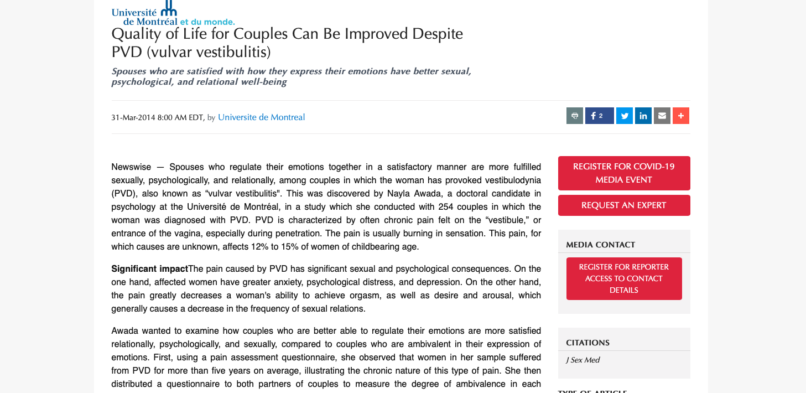Healing for vaginismus

Healing for vaginismus
April 2, 2014 Comments Off on Healing for vaginismus“Ambivalence in expressing emotions indicates oneself dissatisfaction with the way one expresses emotions,” says Awada. “The more ambivalent you are, the less you are able to communicate your emotions satisfactorily, and the more you are likely to be uncomfortable with your partner.” For example, when angry individuals avoid talking so as not to be misunderstood, or express themselves more aggressively than they intended to, they are communicating ambivalently. In Awada’s study, these situations are associated with a more difficult adaptation to the pain in the couples. “In addition, the ambivalence of both partners is related to greater emotional distress and more sexual and relational difficulties in the couples,” says Awada.
Lastly, the researcher found that when at least one of the partners is ambivalent in expressing his or her emotions, the couple is more likely to experience relational dissatisfaction and psychological distress. Furthermore, it seems that ambivalent women have greater vestibular pain compared to less ambivalent women. Therefore, links between better emotional regulation and pain need to be further examined in this population. “Communicating well does not necessarily mean saying everything, but rather that each partner is consistent with his or her needs,” she says. This may mean “negotiating” sexual activities, such as having relations without penetration, which does not prevent one from having a satisfying sexual intimacy.
According to Awada, the study she conducted is the first to focus on emotional regulation in the management of sexual pain in couples. “Emotional regulation has been addressed in studies on chronic pain in a broader sense, but not for pain occurring during sexual intercourse, which is nevertheless frequent and a source of great distress,” says Awada, who is currently completing a specialized internship in chronic pain in order to enrich her clinical understanding of this problem.
The conclusion:
Spouses who regulate their emotions together in a satisfactory manner are more fulfilled sexually, psychologically, and relationally, among couples in which the woman has provoked vestibulodynia (PVD), also known as “vulvar vestibulitis”.
Ok, this is pretty much a geek-speak level article — but it’s saying something key that therapists on the ground have known for years: Vaginismus often has an emotional or relational source — and usually has both.
And, it’s also reinforcing another truth: Fixing patterns of emotional intimacy (And usually the embedded guilt, shame and fear that seems to come as a package deal) can sometimes do so much more than a batch of stretching exercises…